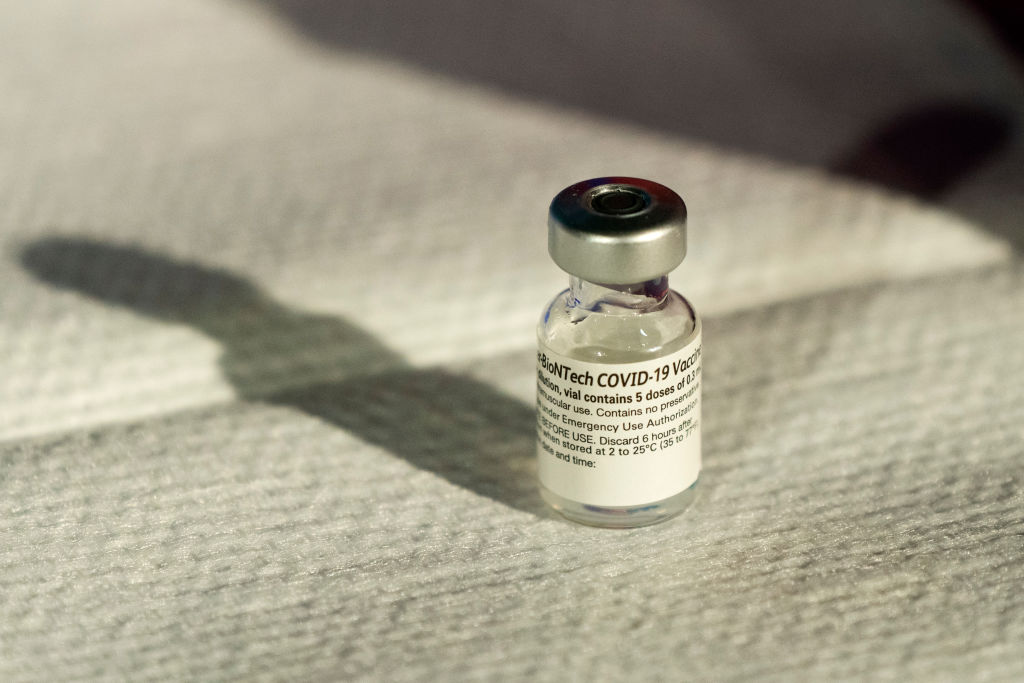
When the Pfizer COVID-19 vaccine received emergency authorization from the FDA, some people got excited, others got nervous, but it seems like everyone had questions. Is it being rushed? Does it call allergic reactions? What's in it is one of the most commonly asked questions.
READ: Experts Explain Why Fully Vaccinated People are Still Getting Infected With COVID-19
Its ingredients list has been published online in a fact sheet for vaccine recipients and caregivers. This is the full list of ingredients, according to the FDA.
Ingredients in Pfizer's COVID Vaccine
- mRNA
- Lipids (including ((4-hydroxybutyl)azanediyl)bis(hexane-6,1-diyl)bis(2-hexyldecanoate), 2 [(polyethylene glycol)-2000]-N,N-ditetradecylacetamide, 1,2-Distearoyl-sn-glycero-3- phosphocholine, and cholesterol)
- Potassium chloride
- Monobasic potassium phosphate
- Sodium chloride
- Dibasic sodium phosphate dehydrate
- Sucrose
READ: Do Vaccines Stop the Spread of COVID-19? What You Need to Know
What Each Ingredient Does
mRNA
Messenger RNA, or mRNA is genetic material that can instruct human cells to make a coronavirus protein called spike. Once manufactured, spike teaches the immune system to recognize the coronavirus so it can be fought off in the future. mRNA medicines aren’t small molecules, like traditional pharmaceuticals. And they aren’t traditional biologics (recombinant proteins and monoclonal antibodies) – which were the genesis of the biotech industry. Instead, mRNA medicines are sets of instructions. And these instructions direct cells in the body to make proteins to prevent or fight disease.
Most work on using mRNA to provoke an immune response has so far been focused on cancer, with tumor mRNA being used to help people’s immune systems recognize and respond to the proteins produced by their specific tumors. ‘This technology was very good for the oncology field because you can develop patient-specific vaccines because every tumor is different,’ said Prof. Bekeredjian-Ding.
Using tumor mRNA in this way activates the body’s T-cells – the part of the acquired immune system that kills cells, which is useful to destroy tumors. It could be important for coronavirus, too. ‘In viral infections, often we know that there is a need for a strong T-cell response because viruses like to hide in cells,’ said Prof. Bekeredjian-Ding. ‘There is a certain hope that, especially in this setting, this could really work … and thereby eliminate … the infected cells from the body.’
Lipids
According to experts, all the ingredients in the vaccine are needed, but the lipids are also a crucial element. "The lipids, which are fats, are very important because they form a little spherical shell around that mRNA," William Schaffner, MD, an infectious disease specialist, and professor at the Vanderbilt University School of Medicine, tells Health.
The lipids are "how the vaccine
is delivered to your body and to your cells," infectious disease expert Amesh A. Adalja, MD, senior scholar at the Johns Hopkins Center for Health Security, tells Health.
Lipids "help keep the mRNA intact and stable until it gets into your body and starts doing its work," Dr. Schaffner says. After that, they dissolve and are removed by your body. Because of that, lipids are "unique" to this type of vaccine, Jamie Alan, PhD, an assistant professor of pharmacology and toxicology at Michigan State University, tells Health. But, she says, "the rest of the ingredients are very common in vaccines."
Allergies
Allergies are your body's inappropriate immune response against something harmless — pollen, cat hair, foods like peanuts, fish, and the like. Right now, there’s no evidence that people with mild allergies, which are quite common, need to avoid the vaccine. In many cases, the results of this overreaction are mild symptoms such as a runny nose, coughing, or sneezing.
READ: Women Are Experiencing different COVID side effects than men! But Why?
But the thing about allergies is that they are specific: a reaction to one substance does not guarantee a reaction to another. On Monday, the American College of Allergy, Asthma, and Immunology released guidance stating that people with common allergies “are no more likely than the general public to have an allergic reaction to the Pfizer-BioNTech Covid-19 vaccine.”
Guidelines released by the Centers for Disease Control and Prevention identify only one group of people who might not want to get Pfizer’s vaccine: those with a known history of severe allergic reactions to an ingredient in the injection.
People with a history of anaphylaxis to any other substance, including other vaccines or injectable drugs, can still get the vaccine, but they should consult their health care providers and be monitored for 30 minutes after getting their shots. Everyone else, like people with mild or no allergies, need to wait only 15 minutes before leaving the vaccination site.








